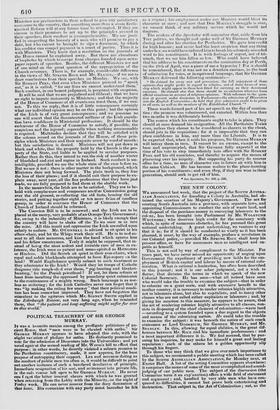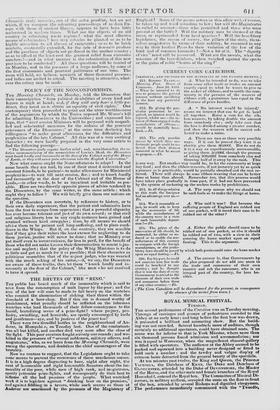THE NEW COLONY.
We announced last week, that the project of the SOUTH AUSTRA- LIAN ASSOCIATION, for founding a Colony in Australia, had ob-
tained the sanction of his Majesty's Government. The act for
erecting South Australia into a province, with separate laws, and appointing Commissioners to conduct the sale of waste land, and the disposal of the purchase-money in conveying labourers to the colony, has been brought into Parliament by Mr. WOLRYCHE WHITMORE; who deserves high credit for the constancy with which, in spite of numerous obstacles, he has pursued this great national undertaking. A great undertaking, we venture to say that it is; for if it should be conducted as wisely as it has been planned, it must, by the way of example, produce a revolution in our Colonial policy,—provided Mr. SPRING RICE shall keep his present office, or have for successors men as intelligent and ca- pable as himself. This is not said by way of compliment to the Minister. For years past, we have never missed an opportunity of urging upon Government the expediency of providing new fields for the em- ployment of British capital and labour by means of rational colo- nization. What is rational colonization, has often been described in this journal ; and it is our sober judgment, not a wish to flatter, that dictates the terms in which we speak of the new Colonial Secretary. He has seen—what all indeed have seen who would take the trouble to examine the subject—that in order to colonize on a great scale, and with extensive benefit to the mother country, it is necessary to render colonies highly attractive, not to labourers alone, but also to capitalists, and to many other classes who are not called either capitalists or labourers ; and, by giving his sanction to this measure, he appears to be aware, that the art of rendering colonies highly attractive to all classes, con- sists in disposing of the chief element of colonization—waste land —according to a system founded upon a due regard to the objects and means of the colonizing nation. He could take the trouble to examine the subject: it was beneath the notice of such crack statesmen as Lord GODKRTCH, Sir GEORGE MURRAY, and Mr. STANLEY. In this, allowing for equal abilities, is the great dif- ference between Mr. RICE and his immediate predecessors : and a most important difference it is. We feel assured, that by pur- suing his inquiries, he may make for himself a great and lasting reputation : each of the others let a golden opportunity slip through his fingers. To those who may think that we give over much importance to this subject, we recommend a public meeting which has been called by the SOUTH AUSTRALIAN ASSOCIATION, for Monday next. at Exeter Hall. A list of the acting Committee appears elsewhere: it comprises the names of some of the most accomplished and sound- judging of our public men. The subject of the discussion (the , Committee term it an exp'anation) offers a wide field of statement I and argument ; and, handled by very able men who have con- quered its difficulties, it cannot but prove both entertaining and instructive. That subject is, the Art of Colonization ; not, as the
Chronicle truly renetiks, ono of the arks perditev, but an art which, if we compare the colonizing proceedings of ni dern Eu- rope with those of ancient Greece, appears to have been little understood in modern tirees. What are the objects of an old country in colonizing waste regions ? what the most effective means of colonization ? how may colonies he planted so as to be highly attractive to all classes of emigrants; so as to be brisk markets, continually extended, for the sale of domestic produce and the purchase of objects not pe.duced in the mother country ; so as to Aim' at the least cost the greatest relief from excessive numbers?—and in what manner is the colonization of this new province to be conducted ? All these questions will be treated of on Monday, and in the presence of a large audience, by some of the first economists and practical politicians of our time. The room will hold, we believe, upwards of three thousand persons; and ladies are invited to attend. The meeting is attractive, what- ever the colony may be made.























 Previous page
Previous page